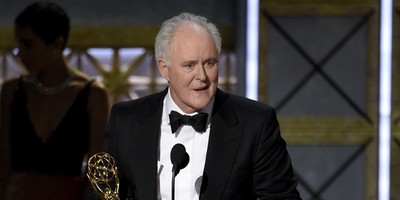To understand how, consider that the Democratic explanation for our current malaise is utterly fallacious. Mr. Obama and his allies identify the "Bush tax cuts," "two wars that weren't paid for," and "deregulation" as the causes of America's present economic doldrums. But federal outlays as a percentage of GDP under George W. Bush averaged 19.6 percent. Under Obama, spending has ballooned to 24.1 percent of GDP. Much of Bush's spending was temporary (the two wars, one of which Obama expanded). But Obama's spending on new entitlements is permanent and bound to increase over time, further burdening a country already facing an entitlements crisis.
If President Obama really believed that spending "on a credit card" caused our troubles, he wouldn't have spent even more than Bush did, would he? He wouldn't have run up the debt to more than 100 percent of GDP or $16 trillion -- a figure, by the way, that Mr. Obama didn't know when David Letterman asked.
The Bush-did-it excuse also evaporates when you consider that the economy was starting to recover from the 2008 recession by mid-2009. According to Obama Administration figures, real GDP growth reached about 3 percent at the start of 2010. But it began to decline later in the year. What happened in 2010? The two signature initiatives of the Obama presidency were signed into law. Much has been written about the job-depressing consequences of Obamacare, less about the sclerotic effects of Dodd/Frank.
Dodd/Frank was the Democrats' answer to the financial crisis. Written by two men who contributed handsomely to the housing bubble, the law ignored Fannie and Freddie. It was supposed to prevent systemic threats to the financial system and prevent "too big to fail" banks from endangering the economy. Instead, it enshrined "too big to fail" -- which is why Mitt Romney described it as a "big kiss" to Wall Street banks.
Just as Obamacare creates an unaccountable board of 15 "experts" to dictate Medicare spending decisions, Dodd/Frank gave the new Consumer Financial Protection Bureau broad authority to regulate banks, credit unions, securities firms and a variety of other businesses. Yet the CFPB itself is totally unaccountable. Congress has no oversight as it doesn't have power of the purse. CFPB gets its funding from the Federal Reserve. By the terms of Dodd/Frank, the president can remove the bureau's head only under very limited circumstances. And the power of the courts to review CFPB actions is strictly curtailed. "As a whole, Dodd-Frank aggregates the power of all three branches of government in one unelected, unsupervised and unaccountable bureaucrat," explained former White House Counsel C. Boyden Gray, who is challenging the constitutionality of the law.
Recommended
Dodd/Frank weighs in at more than 1600 pages, and has already spawned more than 8000 pages of regulations -- about 30 percent of the estimated total. Many small banks believe Dodd/Frank is putting them out of business. The Wall Street giants can afford to hire compliance officers, but smaller banks are crippled by the regulations. Compliance costs are cutting into banks' profit margins and limiting the capital available for lending.
Beyond compliance costs, banks and other institutions are stymied by the uncertainty about the 70 percent of Dodd/Frank regulations that have yet to be issued.
Even without tax reform, Mitt Romney and the Republicans could jumpstart an economic resurgence if they did just three things: 1) repeal Obamacare, 2) repeal Dodd/Frank and 3) and reverse the Obama policy of hindering domestic energy production.
As Walter Russell Mead documents in a fascinating series in the American Interest, the United States stands poised to become the world's largest producer of fossil fuels. "The energy abundance that helped propel the United States to global leadership ... is back; if the energy revolution now taking shape lives up to its full potential, we are headed into a new century in which the location of the world's energy resources and the structure of the world's energy trade support American affluence at home and power abroad."
But it will require a president not ideologically blinkered by a ruinous commitment to "green energy."
U.S. businesses are sitting on an estimated $2 trillion in liquid assets. They've been frightened into inaction, waiting for a better climate. It may be at hand.
























Join the conversation as a VIP Member